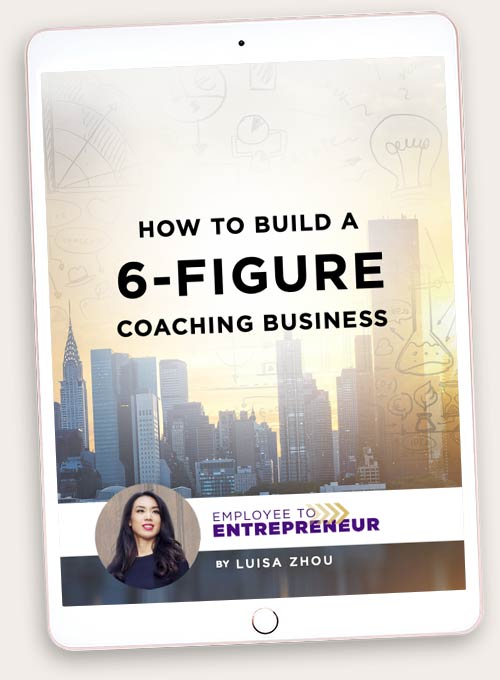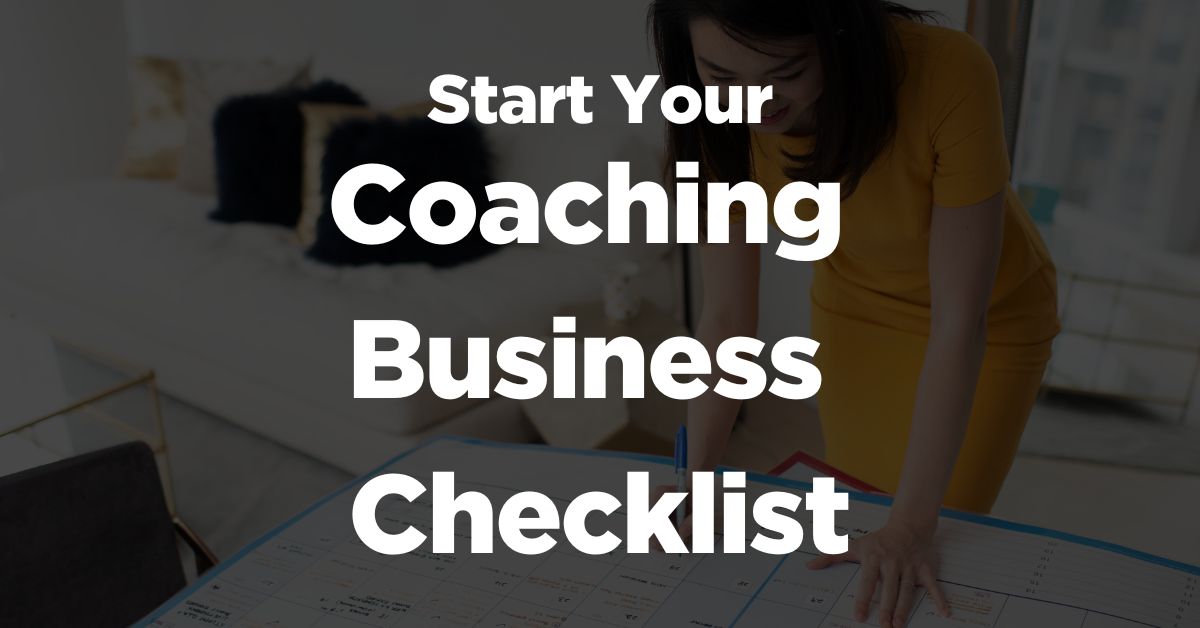Looking for a coaching business checklist?
You’re in the right place. Today, you’ll get the exact steps to check off to start your coaching business.
Let’s go!
Starting a coaching business checklist
5. Name and structure your business
How to start your own coaching business
Coaching is a great online business model for those who want to build a successful business. At its core, coaching is about helping people unlock their potential and live their best life.
And coaching is an in demand field. The coaching industry is currently valued at $2 billion and rapidly growing. According to iPEC, there are over 1 million searches made by people and companies for life coaches, business coaches, and executive coaches each month.
I built my own business to six figures in four months, something I talk more about here:
And today, I’ve helped 1000s of people start their coaching businesses. Below, I share the exact checklist to help you get started with yours. This checklist works for you whatever coaching niche you’re in, whether that’s…
- Health
- Career
- Relationships
- Finance
- Or something else
You can read more about how my students have built their businesses here. Just one example:

You might be thinking, “Okay, this all sounds great – but how do I do it?”
Here’s your coaching business checklist to get you started.
1. Find your business idea
The first thing you need is a business idea.
Don’t panic – you don’t have to start from scratch or come up with the Next Big Thing. Instead, use what you already have.
Believe it or not, your skills and experiences are things that other people will pay for. You just need to choose the right one.
I want you to grab a pen and a piece of paper and spend a few minutes jotting down ideas. But before you do so, take some time to reflect on your personal journey. Ask yourself a few questions:
What are your strengths?
The first step is to identify your strengths.
If you’ve never thought about it, there are plenty of ways to identify them. You might start by reflecting on your life’s successes – what are the skills or traits that keep coming up?
And ask around! Call a few of your friends, family members, or people in your network to discuss what they think you’re best at.
Have you overcome a big challenge?
Your big challenge can be anything you’re proud of, from scoring that promotion at work to learning to run a half marathon.
Get the Ultimate Guide
for building a
6-Figure Coaching Business so you can achieve more freedom!
Have you learned anything while working at your 9-5 job?
Sure, you might be dreaming of leaving your job, but the reality is that there are so many valuable skills you can learn on the job and bring to the table.
There are several tangible skills related to work that people want to learn, such as writing, public speaking, or upskilling.
But there’s also a wealth of other skills people yearn to master. Dig a bit deeper and consider things like:
- Work-life balance
- Giving and receiving feedback
- Setting boundaries at work
What are your hobbies or passions?
What do you like to do in your free time? Maybe it’s running, photography, or even pet grooming. There’s no wrong answer. You can use any of those answers to start a coaching business.
Finding your skill is the first step…the next is to figure out your niche.
2. Decide on your niche
Once you have a skill you want to focus on, you need to narrow down and find your target audience – your niche.
Your niche must provide a solution to a problem that your ideal clients are experiencing – in other words, it should be in demand. If people want it, there’s a good chance that it’s profitable, which is equally important.
Look at audiences who are able to pay for your coaching and want to pay for it.
Here are a few ideas:
- Life skills (confidence coaching, stress coaching, social skills coaching)
- Family (parent coaching, birth coaching, ADHD coaching)
- Life transition (grief coaching, mid-life coaching, life direction coaching)
- Personal development (happiness coaching, EFT coaching, purpose coaching)
Then, go even deeper. Are you a health coach who helps new moms? Are you a marketing coach for online entrepreneurs?
Ultimately, people will be drawn to you because you offer a solution to their specific problem. For more, watch my full “find your niche” tutorial here:
Once you’ve figured out your niche, it’s time to look at your branding.
3. Create a brand
Every coach wants to stand out – and branding your coaching business will help you do exactly that.
There are several strategies that will help you do so successfully. You can learn about five of my favorites in the video below, but for now, start with the following three:
1. Ask yourself what makes you different from your competitors. Maybe it’s your background, personality, style, or years of experience – whatever it is, that’s what’s going to make you stand out.
2. Determine what makes your audience different. You’re not the only one who stands out in the crowd. So do your clients! Hone in on their values and beliefs to create a brand that speaks directly to them.
3. Speak to what makes your product different. This is one of the most important parts of branding. Being different is what will lead to sales – is it more cutting-edge than your competitors’ coaching services? Faster? Easier? If you don’t have an immediate answer to the question, “Why is your coaching different?” take some time to figure it out before launching your coaching business.
4. Develop an offer
So you’ve got your idea, niche, and brand, and you’re feeling ready to create your signature coaching program.
There are three offers that people will pay for in the coaching world: something that makes them feel better, be better, or have more.
It’s not enough to keep things general with something like “health coaching” – tell potential clients exactly what they can expect, such as “cutting sugar out of your diet in three months.”
Next, outline exactly how you’ll do it. What will the client experience look like?
As a new coach, I recommend you start by offering a one-on-one model, where you’ll work privately with each client for the ultimate customization and support. Doing so allows you to charge a premium while getting your feet under you and starting to build your business.
A good rule of thumb for this type of model is a three-month package, including monthly or bi-weekly check-in calls, for $1,500. This way, you’ll earn money while developing your coaching skills.
I talk more about coaching packages here:
5. Name and structure your business
To set up your business, you need a name and a business structure.
Naming your business is easier than you might think.
Because you’re building a personal brand with your coaching business, name the business after yourself.
If you have a more common name, think about adding a coaching-related word to the end, such as “coaching” or “coach.”
Remember, the name you choose now doesn’t have to be the one you stay with – you can always change it throughout the early stages of building your business.
And to structure your business, I have a really simple solution for you.
My friend Lisa Fraley, a legal coach, has a package called “Sole Proprietor Biz Registration and Taxes” that helps you register as a sole proprietor, pay taxes, and understand what your legal obligations are as a business owner.
6. Set up a coaching contract
Finally, it’s essential that business owners are to keep themselves – and their business – safe.
To protect your coaching business, get the money you’re owed, and fight any lawsuits, you’ll want to create a coaching contract.
Doing so will help you establish trust, set boundaries, clearly outline the terms of your coaching, and so much more. The best part about a coaching contract? You only need to create it once – after that, you can use it as the standard contract that you and your clients sign.
When creating it, remember that your contract should cover all your bases, including:
- Program description
- Expectations and responsibilities
- Scheduling and communication
- Payment terms
- Confidentiality
But how do you use your contract? When a client decides to work with you, they’ll pay you. Once you receive that payment, send the contract over via a resource like HelloSign.
Be sure to ask new clients to sign as close to payment as possible so you can easily refund them in the event they don’t agree to your terms. And remember, never have your first call before the contract is signed.
I know it seems overwhelming, but I’ve created a step-by-step guide to creating your own contract.
Again, Lisa Fraley offers DIY templates, which I highly recommend you invest in.
Check out her legal starter kit for one-on-one coaching clients, which includes an agreement, disclaimer, as well as a website disclaimer, privacy policy, and terms and conditions.
7. Choose your business tools
Your business does require a few tools to operate properly. We’ve already talked about HelloSign for signing documents.
But there are a few more things to sign up for…
Communication tools
First, you need a way to hold your coaching sessions.
Go simple and choose a tool like Zoom or Google Meet. Both work well for coaching sessions – with Zoom, you can record them and send them to your clients afterward so that they can refer back to the call later on.
You also need tools to support your clients in between calls. Easy: Use Google Drive for file sharing and email, Voxer, Slack, or WhatsApp for text and audio communication.
Also, if you’re wondering what it takes to hold your first coaching call, take a look at this quick video where I help you outline your session:
Payment tools
To accept payments, I recommend Stripe and PayPal – both are great, well-known options that don’t take too much off the top in fees.
Website
Last, tools to build your website…but hold your horses.
So many coaches who are just starting out are chomping at the bit to build and launch a website.
The truth is that you don’t need a website right away. I always recommend that new coaches focus on building the foundation of their business and getting their first paying clients before they think about a website.
In fact, I didn’t have my own website until my business had grown to five figures.
That’s not to say you can’t build a website. If you want to, go for it! Keep things simple with a one-page website that includes an overview of who you are, the type of services you offer, and how to contact you for an initial meeting.
I recommend using an easy-to-use site builder such as WordPress or Squarespace to get it up and running.
Get the Ultimate Guide
for building a
6-Figure Coaching Business so you can achieve more freedom!
8. Get your first clients
We’ve come to the last piece – getting paying clients.
Again, this can be far simpler than it looks from the outside.
Instead of trying to master it all (all the social media platforms, email marketing, webinars…you name it), focus on a few things.
Start with the lowest-hanging fruit. These are:
- Tapping into your network
- Getting in front of your audience
Let’s start with #1.
Ask your network
The easiest way to get clients is to ask your network. That’s because people who know you already trust you.
And no, you don’t have to randomly ask people in your network to buy from you. Instead, reach out to people who have already asked you about the thing you’re selling and let them know what you’re offering.
That’s how I got my first clients when I was building a career coaching business. I reached out to a few coworkers who had previously asked me for career advice.
Some of them said no, while two said yes and I had my first clients.
Get in front of your audience
Another way to build trust quickly is to get in front of your ideal clients on existing podcasts. Podcasts work well because people spend half an hour to an hour listening to you.
Reach out to relevant podcasts in your niche and offer specific topics you can speak on – topics that answer the biggest questions people have in your niche and you KNOW will help the podcast host’s audience.

Of course, these are just a few marketing strategies to look into. You could also take another route, like building relationships on LinkedIn or Instagram (or a platform where your audience hangs out).
The secret is to focus on one or two things before mastering the next thing.
Here are five more places to attract dream clients:
Once you’ve landed your first few clients, it gets easier to attract more clients. That’s because you’ll have built up your reputation and gotten your first testimonials, so potential clients trust you more.
Over to you!
There you have it! That’s your definitive starting a coaching business checklist. What’s left is…checking the boxes!
And to do that, get my free blueprint that shows you exactly how to build a six-figure coaching business – one that offers flexibility, freedom, and the opportunity to have a big impact on people’s lives.
Get it here:

Want to Build a 6-Figure Coaching Business So You Can Achieve More Freedom?
Get Instant Access To My FREE Ultimate Guide Below!
When you sign up, you’ll also receive regular updates on building a successful online business.
Read more:
The Best Online Coaching Business Model
How to Create a Coaching Business Plan








